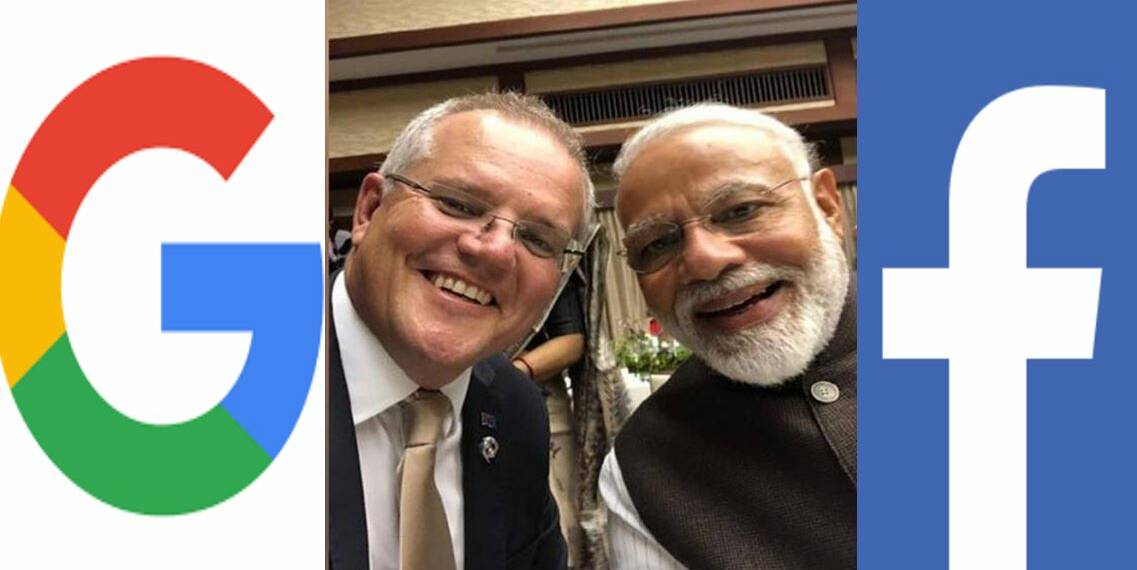Australia has been on a warpath with Big Tech. It upended Google and now has set its sights to make Facebook fall back in line. India, on the other hand, has launched several of its indigenous apps including Koo to take on Big Tech. With the latest announcement by the Australian Prime Minister, Scott Morrison and Indian Prime Minister, Narendra Modi, have joined hands to break the monopoly of Big Tech.
Indian Prime Minister Modi and his Australian counterpart Scott Morrison apparently had a talk discussing several common challenges brief details of which were shared on Twitter by the Indian Prime Minister.
He tweeted, “Spoke with my good friend PM @ScottMorrisonMP today. Reiterated our commitment to consolidating our Comprehensive Strategic Partnership. Also discussed regional issues of common interest. Look forward to working together for peace, prosperity and security in the Indo-Pacific.”
Spoke with my good friend PM @ScottMorrisonMP today. Reiterated our commitment to consolidating our Comprehensive Strategic Partnership. Also discussed regional issues of common interest. Look forward to working together for peace, prosperity and security in the Indo-Pacific.
— Narendra Modi (@narendramodi) February 18, 2021
In his reply to Mr Modi, Morrison tweeted, “Great to talk to my good friend PM @narendramodi again. As Comprehensive Strategic Partners, we can work together on common challenges incl #COVID19, the circular economy, oceans & an open, secure and prosperous Indo-Pacific. We also discussed progress of our media platform bill.”
Great to talk to my good friend PM @narendramodi again. As Comprehensive Strategic Partners, we can work together on common challenges incl #COVID19, the circular economy, oceans & an open, secure and prosperous Indo-Pacific. We also discussed progress of our media platform bill. https://t.co/fjAeLecCYA
— Scott Morrison (@ScoMo30) February 19, 2021
Amid a huge tussle with Google and Facebook back home, Scott Morrison especially indicated that he and PM Modi had discussed Australia’s media platform bill which will basically make big internet platforms pay news portals for the news.
Recently, Google had threatened to disable its search engine in Australia if it’s forced to pay local publishers for their news. At the time Morrison had responded with six words, a small sentence but coercive enough to make Google fall back into the ranks and start coughing up the money to the publishers it owes it to. Morrison had said, “WE DO NOT RESPOND TO THREATS.”
Then it was Facebook’s turn, which suspended news outlets and government websites and even some government-backed accounts, from its platform. Morrison responded fiercely, he said, “Facebook’s actions to unfriend Australia today, cutting off essential information services on health and emergency services, were as arrogant as they were disappointing.
He also said that the platforms think they are bigger than governments. Australia is going ahead with the media platform bill, despite severe objections from Facebook Google and others.
India on the other hand has taken even a harsher stand and one which would have sent a resounding message to Big Tech. The Indian government nailed Twitter when it blocked the Indian Home Minister’s account and misrepresented the Indian map. Moreover, the Twitter Policy head in India was made to quit as Twitter failed to follow the guidelines set out by the Indian government to block some accounts which were inciting violence during the ongoing farmer’s protest.
Apart from the direct attack, a horde of Indian indigenous social media platforms have cropped up and have gained serious traction. Millions of users are migrating to these new Indian apps, the biggest among them being Koo, which has become a sensation in India with millions flocking in within weeks, and will leave an everlasting impact on Twitter and Facebook among others.
Now, with the tweet which has been shared, it is a clear sign that India and Australia will collaborate to make Big Tech suffer. While, India is ensuring that social media majors are held accountable for sensitive issues like user privacy and autonomy, apart from the controversy surrounding unregulated censorship on social media. Australia is making sure that these social media pay their dues.








